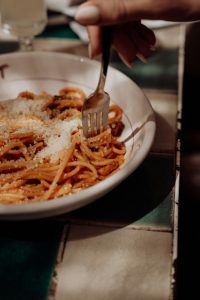In a world saturated with nutrition advice, from influencers to apps to outdated textbooks, it’s no wonder many of us feel confused, conflicted, or even afraid of food. For those in eating disorder recovery, this noise can reinforce disordered beliefs and make healing even harder.
At Evolve Wellness Group, we believe in dismantling food fear and reconnecting with nourishment through trust, not rules. Let’s explore five common nutrition myths that often keep people stuck in a cycle of guilt, restriction, or obsession.
Myth 1: Carbs Are Bad For You
Carbs have been unfairly demonized in diet culture for decades. While low-carb diets might promise weight loss or “clean eating,” the reality is that carbohydrates are your body’s primary energy source, especially for the brain.
In Recovery: Avoiding carbs can prolong mental fog, increase binge urges, and prevent the body from trusting that food is consistently available. Whole grains, fruits, starchy vegetables, and even gentle processed carbs all have a place in a balanced intake.
Myth 2:You Should Always Feel Full After a Meal
Many clients tell me they feel guilty or “wrong” if they don’t feel perfectly satisfied after a meal. But fullness is not a moral compass. Sometimes your body needs more. Sometimes it needs less. And sometimes it takes time to relearn what “enough” feels like.
In Recovery: Fixating on the idea of perfect fullness can lead to second-guessing your needs or trying to “control” hunger with rules. Learning to respond to rather than resist these cues is a big part of the healing process.
Myth 3:Eating Late at Night Causes Weight Gain
This myth often drives people to avoid food at night, even when they’re genuinely hungry. The truth? Your body doesn’t suddenly stop digesting food at 7pm. What matters more is what and how you eat throughout the day, not when.
In Recovery: Honoring hunger cues, whenever they arise, is critical for healing. Skipping a needed evening snack can disrupt sleep, increase cortisol, and slow your metabolism over time.
Myth 4: Sugar Is Addictive Like a Drug
This fear-based message has been heavily pushed in wellness culture. But research shows that “sugar addiction” doesn’t hold up outside of extreme restriction. When you’re chronically deprived of sweet foods, your brain naturally craves them more, just like with any forbidden item.
In Recovery: Giving yourself unconditional permission to eat sweets can actually reduce their power over time. The problem isn’t sugar, it’s the restriction-and-binge cycle that often follows fear.
Myth 5: “Clean Eating” Is the Gold Standard of Health
While the intention behind clean eating may be innocent, the term is often used to moralize food. It creates a binary of “good” vs. “bad” choices and can lead to orthorexia (an unhealthy obsession with healthy eating).
In Recovery: Nutrition is about flexibility, adequacy, and satisfaction, not perfection. True health includes mental peace, social connection, and the ability to enjoy food without obsession or shame.
If any of these myths have been living rent-free in your mind, you’re not alone. These beliefs are everywhere, but that doesn’t make them true, and it doesn’t mean you have to keep carrying them.
At Evolve, we support our clients in challenging unhelpful food rules and rebuilding a relationship with food that’s grounded in trust, flexibility, and compassion. Ready to unpack these myths in your own recovery? We’re here when you’re ready.
Reach out today for a complimentary intake phone call.
We look forward to connecting with you soon!



